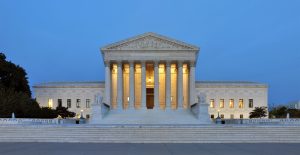Officials Upset With Supreme Court Decision
The U.S. Supreme Court ruled on Janus v. AFSCME on Wednesday, June 27, 2018, that government workers who choose not to join a union cannot be charged for the cost of collective bargaining.
Janus v. American Federation of State, County, and Municipal Employees, was a U.S. labor law United States Supreme Court case concerning the right of labor unions to collect fees from non-union members for the service of collective bargaining. Under the Taft–Hartley Act of 1947, union security agreements can be allowed by state law. The Supreme Court ruled that such union fees in the public sector violate the First Amendment, overturning the 1977 decision in Abood v. Detroit Board of Education that had previously supported such fees.
The following statements were released by Hawai‘i officials following the Supreme Court’s ruling on Janus v. AFSCME.
Gov. David Ige:
“I’m disappointed with the Supreme Court’s decision to overrule a case that for 41 years allowed states to negotiate labor contracts that protected workers’ rights and led to the efficient delivery of government services. Fortunately, Hawaiʻi’s Constitution affords strong protections for workers compared to other states. I hope Hawaiʻi’s workers see the value of union representation and continue to voluntarily support the work of the unions.”
U.S. Sen. Brian Schatz released the following statement on the Supreme Court’s ruling on Janus v. AFSCME.
“This is a huge blow to workers and their families across the country, and for anyone fighting to make sure that public employees are fairly treated and compensated. Union membership has always led to higher wages, better benefits, and a path to the middle class. With this ruling, state and local governments have a green light to try and weaken the bargaining power of public employee unions. Potentially, that means teachers, fire fighters, police officers, and other public employees will have smaller paychecks and fewer benefits. It is now up to our elected leaders to stand up for unions, which have served as a strong counterweight to economic inequality. Moving forward, I will work closely with Hawai‘i’s public employee unions to ensure that its members and the public understand that supporting unions is one of the best ways we can support the middle class.”
Sen. Mazie K. Hirono released the following statement on the Supreme Court’s decision on Janus v. AFSCME Council 31.
“America’s public sector workers teach and nurture our children, keep us safe, and care for our families. As union members, they are empowered through collective action to fight for fair wages and work conditions. This partisan, political decision from the Supreme Court will undermine public sector unions’ ability to fight for these basic protections for the 17.3 million public employees they represent. The Court’s decision continues a decades-long assault funded by far-right groups, such as the Koch Brothers, on working people. We must fight back. Joined by my Senate and House colleagues, I’ll be introducing legislation to establish the right of every public sector employee to join a union and bargain collectively.”
Sen. Hirono and Rep. Matt Cartwright (D-Penn.) will introduce the Public Service Freedom to Negotiate Act to ensure that public sector employees across the country are able to form and join a union and enter into a written contract with employers. The bill also reaffirms that it is the policy of the United States to encourage collective bargaining.
Congresswoman Colleen Hanabusa issued the following statement:
“The Supreme Court issued a decision today that overruled forty-one years of labor precedence. Following an unrelenting, six-year, partisan campaign to overrule Abood v. Detroit Board of Education, the Supreme Court ruled that the public-sector unions’ collection of agency fees for collective bargaining was barred by the First Amendment. This decision abolished major principles that government and its employees have abided by for decades. Essentially, public-sector labor will be prevented from collecting agency fees for the services they provide non-members, like negotiating work hours, vacation time, healthcare plans and other non-political activities. The people of Hawaii believe in fairness and that people should pay for their fair share. Notwithstanding the Supreme Court has instructed the state and unions that there are alternative ways to represent or not represent. This is where the state and unions can negotiate. As a labor attorney and a firm believer in the balance of collective bargaining, I know that government’s greatest asset is its employees. The most effective and efficient way to manage that asset is through collective bargaining and union representation. Our hard working families and government benefit from that. We must focus on negotiating in good faith to ensure that we are managing our resources and providing protections and a living wage for our workers.”







